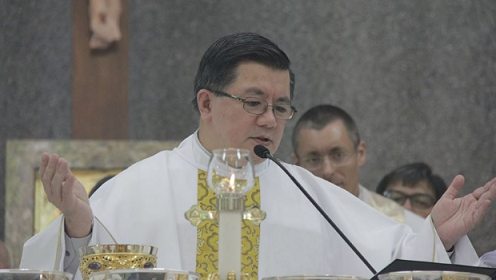18th Sunday in Ordinary Times
Gen. 18:20-31; Psalm 137: 1-3.6-8; Col. 2:12-14; Gospel of Luke 11:1-13
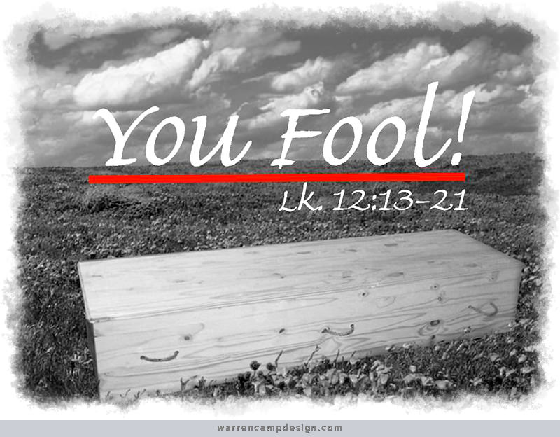
Preached by Msgr Philip Heng, SJ at Cathedral of Good Shepherd, Singapore on 4 August 2019
 Today’s theme of the Gospel very concretely relates the meaning of the material possessions and riches of our lives with the reality of death and God’s gift of eternal life. This theme is not easy to preach on, as many of us are not comfortable with reflecting on such realities of our lives. Many of us would rather live from one day to another as though death will never come. And so, subconsciously, we deliberately distract ourselves or even numb our senses from such a reality instead of embracing it in the light of the Gospel Truth that Jesus proclaims today to you and me. I would like to begin with a story.
Today’s theme of the Gospel very concretely relates the meaning of the material possessions and riches of our lives with the reality of death and God’s gift of eternal life. This theme is not easy to preach on, as many of us are not comfortable with reflecting on such realities of our lives. Many of us would rather live from one day to another as though death will never come. And so, subconsciously, we deliberately distract ourselves or even numb our senses from such a reality instead of embracing it in the light of the Gospel Truth that Jesus proclaims today to you and me. I would like to begin with a story.
Leo Tolstoy, a great Russian novelist once wrote about the story of a peasant called Pakhom. Pakhom longed to own a piece of land. One day, an opportunity arose, and he scraped every penny he had to buy the forty acres of land, and he was overjoyed.
After some time Pakhom, was not fully satisfied. When he heard that another region had a larger and better piece of land. So he sold everything he had and eventually found the piece of land and bought it. This land was double the size, was very fertile and he made a lot of money.
Then one day, a stranger passed by who told him that beyond the mountains, lived a certain tribe that had endless and excellent grassland. The people are as simple as sheep and you can get anything out of them for almost nothing. This was too good to be true, and so Pakhom went in search for this tribe. True enough, the chieftan welcomed him warmly. He told Pakhom, “For one thousand roubles, he can have as much land as you can walk in one day. However, the condition is that you must return to the spot where you started, before sunset, or else your money will be forfeited.” Pakhom agreed and was very excited with the excellent offer.
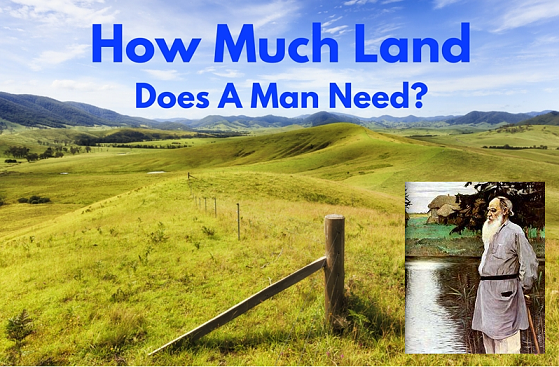 That night, Pakhom could not sleep all night as he was thinking of the land that would soon be his. As soon as the sun peeped above the horizon, Pakhom, who did not even have time for his breakfast, started off. A marker was put into the ground. Men followed him on horseback and drove stakes into the ground to mark the path that he had walked.
That night, Pakhom could not sleep all night as he was thinking of the land that would soon be his. As soon as the sun peeped above the horizon, Pakhom, who did not even have time for his breakfast, started off. A marker was put into the ground. Men followed him on horseback and drove stakes into the ground to mark the path that he had walked.
Pakhom walked fast, and the further he walked, the land became increasingly better. Pakhom was making excellent progress till it was dinner time and he was getting weaker. He grabbed a bite and continued walking. He began to veer to his left, but it was difficult to close the circle of where he started. In his eagerness to cover as much land as possible, Pakhom had lost track of time. To his horror, he saw that the sun was beginning to sink, and he realised that his starting point was very far away.
Pakhom was by now worn out from his hunger and walk; he was exhausted. He pleaded “If only the sun would wait for me; but it is clear that it wouldn’t. He kept telling himself, never to give up. So, he pressed on as the sun was constantly threatening to set. Just as he made it to the top of the hill, of the starting point, the sun dipped beyond the horizon. Pakhom just made it and collapsed. The chieftan said, “Ah Pakhom, congratulations, you have earned much land; more than any man I can remember. But, Pakhom made no reply. They turned him over. He was dead. They buried him where he fell.
My brothers and sisters in Christ, the story of Pakhom in many ways symbolises very graphically, what is happening to millions if not billions of people in the secular world. Pakhom, is a reminder to us of the hectic and stressful life that we live of frantically trying to gain as much material wealth as possible, and in the end we die and leave behind everything that we have worked for. If this is so, then the sad reality of this truth is that we would have worked very hard, in vain, and eventually die unfulfilled, /unless our labour were done with God’s providence of the Eternal Life, as our ultimate goal in life.
The life of Pakhom and the rich man in today’s Gospel are closely related. And this is precisely what Jesus is proclaiming in today’s Gospel of the rich man in the parable, who after being blessed with a good harvest planned how he would pull down his smaller barns, and build bigger ones, and would say to his soul, “My soul, you have plenty of good things laid by for many years to come; take things easy, eat, drink, have a good time.” But God said to him, “Fool! This very night the demand will be made for your soul; and this hoard of yours, whose will it be then? So it is when a man stores up treasure for himself in place of making himself rich in the sight of God.”
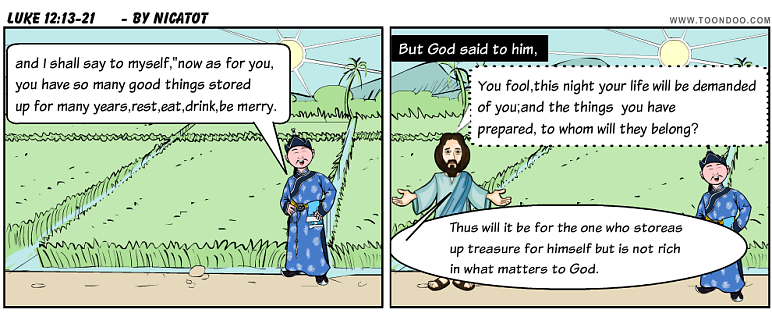
My sisters and brothers in Christ, the message of Jesus is clear. The rich man in the parable is not accused of any ill-gotten wealth. In fact, he was blessed with a good harvest. His problem was not that he was rich, but that he had forgotten God in his riches. He had forgotten that his riches had come as blessings from God, and in his ingratitude, he was blinded from the truth that he could die any time.
The sin of the rich man was first of all, the sin of presumption. He presumed that he would live a long life, and so he only planned for what he thought would be many years of enjoying a good time of comfort and luxury in his retirement. But, God’s plan was otherwise. That very night, his life would come to an end.
We can see that the source and the cause of the sin of the rich man’s presumption was his sin of ingratitude to God for the abundant blessings that God has given him. This ingratitude in turn led him to commit the sin of omission. And so, instead of thanking God, he attributed his good harvest to himself, and he selfishly only planned for his own needs of comfort and enjoyment. There was no mention at all about sharing his good harvest with his workers, or with the poor and needy.
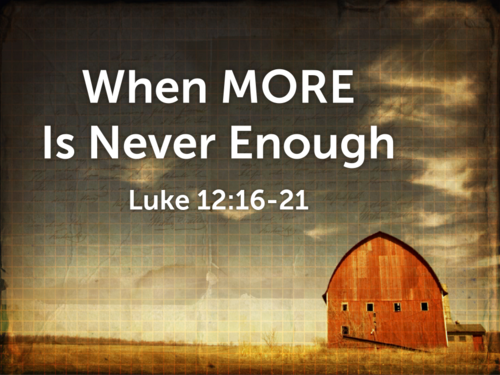 My brothers and sisters in Christ, let us also not forget that in today’s Gospel, Jesus explicitly cautioned the man in the crowd who had asked him to be his arbitrator of his property with his brother, to be on guard against avarice of any kind. For this Jesus says, “a man’s life is not made secure by what he owns, even when he has more than he needs.” By this Jesus is reminding us too that none of our material possessions and riches can give us the deep security in life that we need. For this, Jesus explained that the true riches are those that “make us rich in the sight of God.”
My brothers and sisters in Christ, let us also not forget that in today’s Gospel, Jesus explicitly cautioned the man in the crowd who had asked him to be his arbitrator of his property with his brother, to be on guard against avarice of any kind. For this Jesus says, “a man’s life is not made secure by what he owns, even when he has more than he needs.” By this Jesus is reminding us too that none of our material possessions and riches can give us the deep security in life that we need. For this, Jesus explained that the true riches are those that “make us rich in the sight of God.”
In another words, the true security and the true riches of our lives are the spiritual realities of our lives, and not the material riches of our lives. In short, the true wisdom you and I are called to live, /is a life that must never exclude the goal of gaining the eternal life that God has prepared for us, and wants to give us when we die.
And this can only be achieved if we live the Christ-like life that you and I are called to live. For this, my brothers and sisters, I believe we must not only live the values of Jesus daily, but we must also develop a deep and personal spirituality of being able to see that God has created us to live for all eternity with Him in heaven.
In other words, we must live in the consciousness that our true home is in heaven, and as such our earthly life is only a transition and an earthly phase of our relationship with God. Our relationship with God is to last for all eternity, and our fuller and more glorious relationship with God is in heaven. And, if we are deeply rooted in this reality, then our deepest longings and desires of our lives are to love God wholeheartedly, with our mind, heart, soul and strength so that we can live with Him in heaven.
This also means that, unlike the rich man in the parable, we are called to be detached from our material possessions of this world and live in the peace of knowing and accepting that death is but a reality that we should never fear, but embrace when the time comes for us to return to God. Such a spirituality, would give us a perspective that as St Ignatius of Loyola would say, of finding God in all things, and living our lives for His Greater Glory.
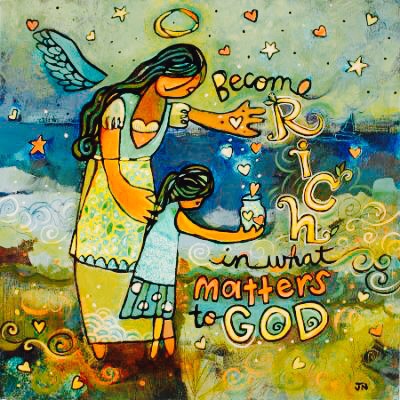 My sisters and brothers in Christ, if we want to have an indication of whether we are living such a wholesome and Christ-centred spirituality, we could begin by asking ourselves the following questions.
My sisters and brothers in Christ, if we want to have an indication of whether we are living such a wholesome and Christ-centred spirituality, we could begin by asking ourselves the following questions.
- If God were to appear to us and gently tell us that we have two weeks left on earth before we die, “What would our response be?” “Would we thank Him for giving us the two weeks, or would we bargain for more time to prepare our souls for death and settle many unfinished matters with our family and friends or would we panic and ask God not to take our lives?
- If God were to be moved with compassion and is willing to extend our life on earth and asks us, “How long more do you wish you need to prepare your soul to meet Me?” “What would our answer be? Would it be one month, one year, ten years, twenty years?” Whatever our response is to God, “Do you think the extra time we bargain to have on earth will make much difference to the quality of our lives?”
For some of us the “extension” of time will wake us up and we will fortunately, live a more vigilant life. However, for most of us, even if God were to give us the extension of twenty years, the truth is not so much the length of time we have on earth, but the quality of our daily living that truly matters.
And so as I conclude, let us remind ourselves that unlike the rich man in the parable, we are called to live in the conscious awareness that part of our lives is the reality that you and I can die any time, regardless of our age, position and even how healthy we may be.
Death is the inevitable reality that every human person has to encounter; /for some it is sooner, for others, it is later, and for everyone it is unknown. If our faith is strong and our relationship with Jesus is personal, then we will have the wisdom of living in God’s Will daily, and as such we will not fear death, because Jesus assures us that we will receive the gift of eternal life and happiness when we die. And to live in such an assurance of our faith, is to live in the true security of our souls, that Jesus says, “is making ourselves rich in the sight of God.”
In Kenya, some Africans still follow the practice of removing the clothes from the dead before burying the person, in order to symbolise that we leave the world the same way we came into it. Therefore, what counts at our death is not the material wealth that we have acquired during our earthly life, but the spiritual richness and graces that we possess for our journey to meet God.
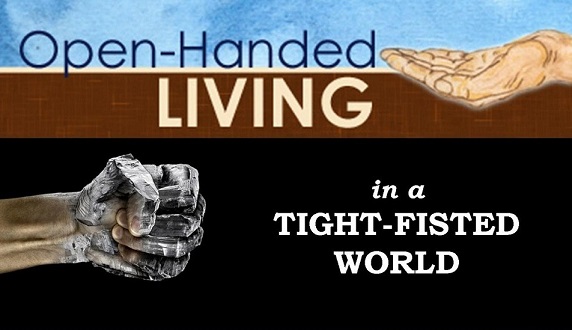 (Prov.10:22) says, “Riches and wealth come from God and no one succeeds by his (her) own strength”. With these in mind, we ought to see riches as divine provisions to aid our eternal journey. This means that riches should not be allowed to master our lives, as in the story of Pakhom, who spent his whole life and energy to accumulate his material wealth, and eventually died a miserable and lonely death.
(Prov.10:22) says, “Riches and wealth come from God and no one succeeds by his (her) own strength”. With these in mind, we ought to see riches as divine provisions to aid our eternal journey. This means that riches should not be allowed to master our lives, as in the story of Pakhom, who spent his whole life and energy to accumulate his material wealth, and eventually died a miserable and lonely death.
And if we are not careful, like Pakhom and the rich man in the parable of today’s Gospel, we too will fall into the similar temptations and traps of the secular world, and live a life of the sin of ingratitude to God and the sin of the omission of using God’s blessings for the good of others, the church and especially for the poor and needy, and as such constantly live in the fear of death, instead of “making ourselves rich in the sight of God” and preparing ourselves to gain the gift of the eternal life that God’s wants to give us.
Story Adapted from: Sunday & Holy Day Liturgies, Year C; Flor McCarthy, S.D.B.;Pub.: Dominican Publications; 1994; p.179-180
Msgr Philip Heng, S.J.
